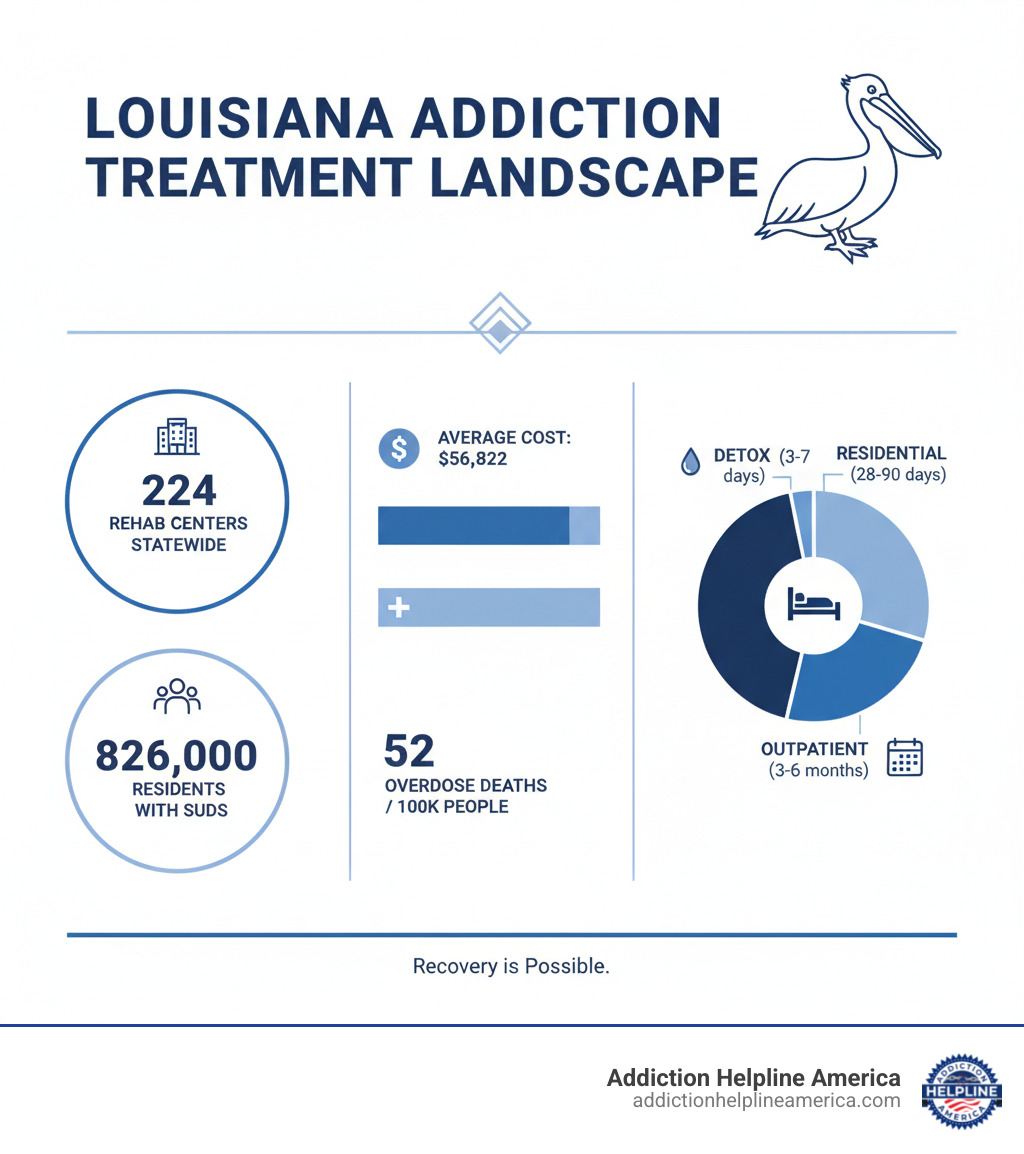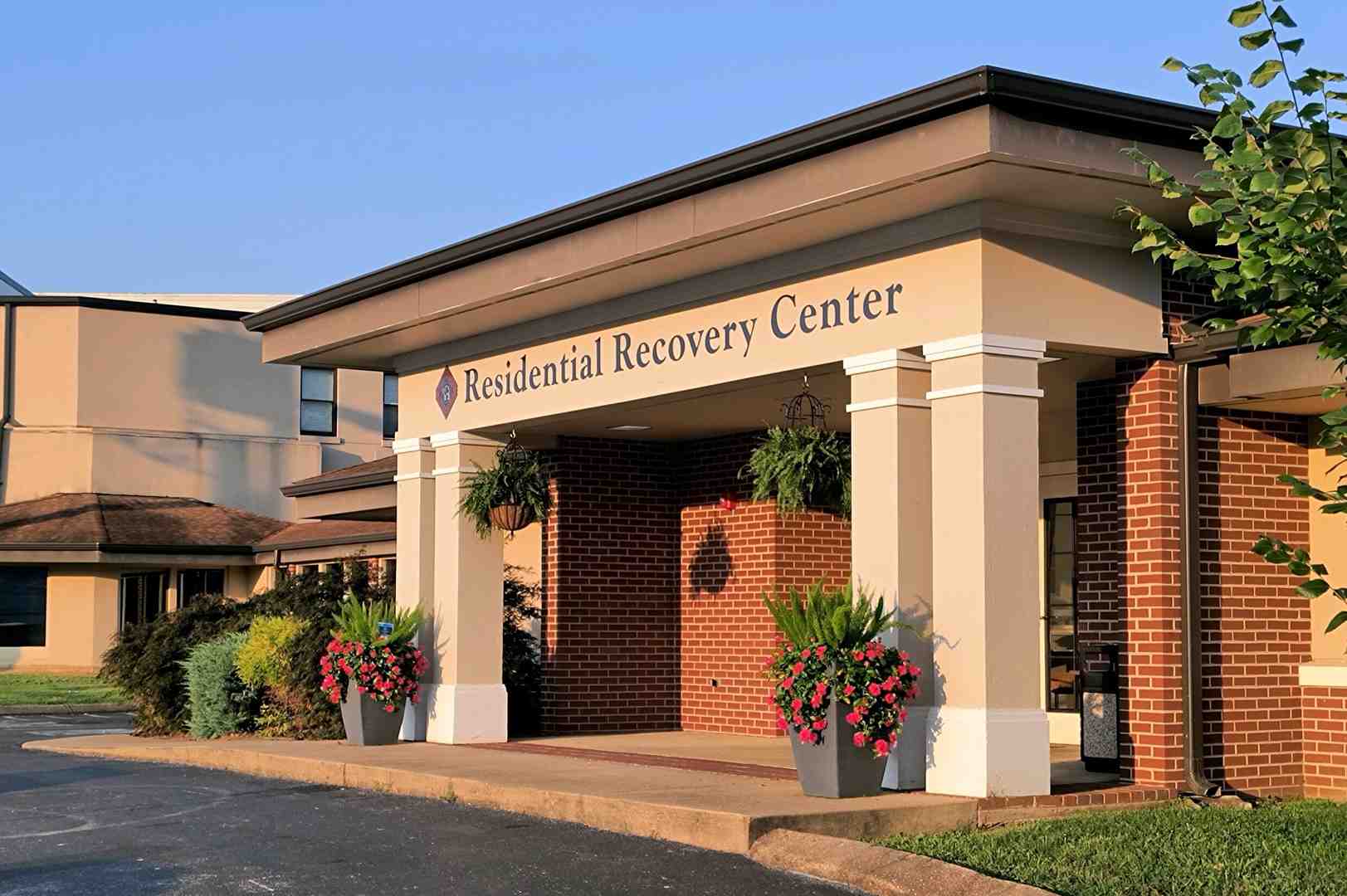
Finding Hope and Help: Why Choosing the Right Rehab Center Matters
Rehab centers in Louisiana offer vital support for those affected by addiction. With 224 facilities statewide, finding the right fit is key. Here’s a quick guide:
- Statewide Options: 224 centers offer detox, inpatient, outpatient, and specialized care.
- Average Cost: $56,822 for comprehensive treatment, but insurance significantly lowers this.
- Key Locations: New Orleans, Baton Rouge, Lafayette, and Shreveport.
- Insurance: Most centers accept Medicaid, Medicare, and private plans like BCBS, Aetna, and Cigna.
Louisiana faces a serious challenge, with an overdose death rate 67% higher than the national average and 826,000 residents having a substance use disorder. Despite these numbers, recovery is possible. The right rehab center is the crucial first step, with options ranging from serene residential facilities to flexible outpatient programs.
Navigating these choices can be overwhelming. At Addiction Helpline America, we provide free, confidential guidance to connect you with accredited rehab centers in Louisiana that match your needs, insurance, and circumstances. We’ve helped thousands find their path to recovery.

Rehab centers in louisiana terms you need:
1. Assess the Levels of Care and Treatment Environments
Finding the right rehab centers in Louisiana begins with understanding the level of care you need. The American Society of Addiction Medicine (ASAM) provides criteria that professionals use to recommend the right program. This assessment considers withdrawal severity, physical and mental health, readiness for change, relapse risk, and your home environment to ensure the best chance of success.
Louisiana offers a full spectrum of care, from 24/7 residential programs to flexible outpatient options that fit your life. Whether you prefer the energy of New Orleans or a quieter setting, there’s a fit for you.
Here’s how the main treatment environments compare:
| Feature | Inpatient/Residential Treatment | Outpatient Treatment (IOP/PHP) |
|---|---|---|
| Structure | Highly structured, 24/7 supervision, removed from triggers. | Flexible, allows individuals to live at home or in sober living, attend treatment sessions at a facility. |
| Time Commitment | Full-time residency (28-90+ days typically). | Part-time, usually several hours a day, multiple days a week. |
| Cost | Generally higher due to 24/7 care, accommodation, and meals. | Generally lower, as it doesn’t include living expenses. |
| Ideal Candidate | Severe addiction, unstable home environment, co-occurring disorders, need for medical detox. | Stable home environment, strong support system, less severe addiction, step-down from inpatient care. |
Types of Addiction Treatment Programs
Rehab centers in Louisiana offer distinct programs for different stages of addiction.

Medical Detox is the first step for those facing dangerous withdrawal from substances like alcohol, opioids, or benzodiazepines. Medically supervised detox is critical for safety and comfort. Louisiana has both inpatient and outpatient detox facilities to manage symptoms and ensure a safe start to recovery.
Inpatient Rehab and Residential Treatment provide 24/7 care in a live-in facility. This is ideal for severe addiction, co-occurring mental health issues, or an unsupportive home environment. Facilities like Palmetto Addiction Recovery Center and Whispering Oaks Lodge offer structured, sober environments focused on healing.
Outpatient Programs like Partial Hospitalization (PHP) and Intensive Outpatient (IOP) offer flexibility for those with stable living situations. You receive intensive therapy while living at home. These programs are widely available and often serve as a step-down from residential care.
Sober Living Support offers a structured, substance-free home to transition from intensive treatment to independent living. These homes provide peer support and accountability, which are crucial in early recovery. Many are low-cost or free, removing a significant financial barrier.
Call Now – Your Journey to Recovery Begins Today!

Take the first step towards a healthier life! Call now to connect with our compassionate team and start your recovery journey today. Your path to healing awaits!
Our recovery specialists are available 24/7 to provide support, and all calls are confidential and free. Reach out anytime – we’re here to help!
Key Features and Amenities to Look For
The quality of your experience at rehab centers in Louisiana also depends on their features.
- Individualized treatment plans: The best centers create a plan custom to your unique story and goals.
- Comfortable accommodations: A safe, peaceful space is essential for recovery. Some centers offer private rooms and tranquil settings.
- Recreational and holistic options: Fitness centers, yoga, art therapy, and meditation support whole-person healing.
- Nutritious meals: Good nutrition fuels physical and mental recovery.
- Peaceful environments: A serene setting reduces stress and allows you to focus on healing.
At Addiction Helpline America, we help you find a center that meets your clinical needs and personal preferences, because the right environment makes healing easier.
Free Confidential Guidance to Find Top Louisiana Rehab Centers
When choosing a facility, accreditations and therapeutic approaches are your proof of quality. They show that a center meets high standards and uses effective, research-backed methods. The best rehab centers in Louisiana combine these evidence-based practices with holistic approaches to treat the whole person.
Staff qualifications are just as crucial. Look for a team of licensed doctors, psychiatrists, counselors, and nurses. Many staff members at top facilities also have personal experience with recovery, bringing a unique level of empathy. When researching care in areas like Baton Rouge, verifying credentials is a valuable step.

Accreditations That Signify Quality
Accreditations from independent organizations signal a commitment to excellence.
- CARF Accreditation: The Commission on Accreditation of Rehabilitation Facilities sets international standards for quality, person-centered care. Palmetto Addiction Recovery Center is one facility that holds this respected accreditation.
- The Joint Commission (JCAHO): This accreditation proves a facility meets strict standards for patient safety and quality of care. Many Avenues Recovery Centers in Louisiana are Joint Commission certified.
- State Licensure: This is a mandatory requirement for all legitimate treatment centers in Louisiana, ensuring they meet basic health and safety standards.
- Office of Behavioral Health (OBH): The OBH oversees addiction treatment in the state, ensuring compliance with national standards.
- SAMHSA Standards: Adherence to guidelines from the Substance Abuse and Mental Health Services Administration shows a commitment to ethical, evidence-based care.
Evidence-Based and Holistic Therapies
Effective treatment blends scientifically proven methods with therapies for overall wellness.
- Cognitive Behavioral Therapy (CBT): Helps you identify and change negative thought patterns and behaviors that fuel addiction.
- Dialectical Behavior Therapy (DBT): Teaches skills in mindfulness, distress tolerance, and emotion regulation, which is helpful for co-occurring conditions.
- EMDR (Eye Movement Desensitization and Reprocessing): A specialized therapy that helps process trauma, a common root cause of addiction.
- Motivational Interviewing: A client-centered approach that helps you find your own internal motivation for change.
- Medication-Assisted Treatment (MAT): Combines FDA-approved medications with therapy to reduce cravings and prevent relapse, especially for opioid use disorder.
Holistic therapies like art therapy and mindfulness complement these approaches by helping you manage stress and explore emotions. The best rehab centers in Louisiana use this combined strategy to build a strong foundation for lasting recovery.
At Addiction Helpline America, we connect you with accredited facilities using the therapeutic approaches best suited for you.
3. Evaluate How They Address Co-Occurring Disorders
Addiction rarely exists in a vacuum. It often co-occurs with mental health conditions like anxiety, depression, or trauma. This is called a dual diagnosis, and how rehab centers in Louisiana treat it is critical for lasting recovery. Treating addiction without addressing the underlying mental health issue is like bailing water from a boat with a hole in it. Integrated treatment, which addresses both simultaneously, is essential.
Untreated depression can trigger a relapse, while active addiction makes managing mental health symptoms impossible. It’s a vicious cycle that requires comprehensive care. Whether you’re looking for options in Alexandria or elsewhere, ensure the facility is equipped to handle both.

The Importance of Dual Diagnosis Treatment
Approximately 50% of people with substance use disorders have dual diagnoses. Many people use substances to self-medicate symptoms of:
- Anxiety: Constant worry, panic, or social fear.
- Depression: The weight of major depressive disorder or chronic low mood.
- PTSD: Intrusive memories and hypervigilance from past trauma.
- Bipolar Disorder: Extreme mood swings that lead to impulsive substance use.
Recognizing this need, 109 programs in Louisiana offer integrated treatment for co-occurring disorders. This approach helps individuals learn healthier coping skills and addresses the root causes of their pain, creating a solid foundation for recovery.
What to Look for in a Dual Diagnosis Program
When evaluating rehab centers in Louisiana, look for these key features for effective dual diagnosis care:
- On-site Psychiatrists: Medical doctors who can provide accurate diagnoses and manage psychiatric medications.
- Licensed Mental Health Counselors: Professionals with expertise in treating conditions like depression, anxiety, and trauma alongside addiction.
- Individual Therapy for Mental Health: Dedicated sessions focused on developing coping strategies for mental health symptoms.
- Medication Management: Careful monitoring of psychiatric medications to ensure they are effective and support recovery.
- Trauma-Informed Care: An approach that recognizes the impact of trauma and creates a safe, non-triggering environment for healing.
Choosing a facility that takes dual diagnosis seriously means treating the whole person, not just the addiction. This comprehensive approach is what builds a foundation for a life worth living.
4. Investigate Specialized Programs and Support Systems
Recovery is not a one-size-fits-all process. The most effective addiction treatment reflects a person’s unique identity, background, and challenges. When searching for rehab centers in Louisiana, particularly in communities like Mandeville, look for programs that understand your specific needs.
Addiction doesn’t happen in a vacuum, and neither does recovery. The best treatment centers involve a person’s community and family in the healing process, making recovery a shared and more sustainable effort.
Call Now – Your Journey to Recovery Begins Today!

Take the first step towards a healthier life! Call now to connect with our compassionate team and start your recovery journey today. Your path to healing awaits!
Our recovery specialists are available 24/7 to provide support, and all calls are confidential and free. Reach out anytime – we’re here to help!
Finding Specialized Rehab Centers in Louisiana for Unique Needs
Specialized programs can be the difference between feeling understood and feeling lost. Louisiana offers programs custom for different groups:
- Veterans: Programs that understand military culture, PTSD, and combat trauma.
- LGBTQ+ Individuals: Affirming care in a safe, accepting space where therapists understand the unique challenges faced by the community.
- Professionals: Discreet treatment that addresses career-specific pressures and licensing concerns, like the program at Palmetto Addiction Recovery Center.
- Teens and Adolescents: Age-appropriate therapies that resonate with the developmental stage and peer pressures of young people.
- Gender-Specific Environments: Men’s or women’s programs that allow for a focused discussion on topics like trauma, relationships, and masculinity.
- Faith-Based Programs: Treatment that integrates spiritual principles, like Evangelhouse Christian Academy, which combines licensed care with Christian values.
- Pregnant and Postpartum Women: Specialized medical and addiction care that protects the health of both mother and baby.
The Role of Family Therapy and Support
Addiction is often called a “family disease” because it impacts everyone. The best rehab centers in Louisiana involve families in the healing process.
Family therapy helps everyone understand their roles in the family system and learn healthier ways of interacting. It provides a safe space for difficult conversations, rebuilding trust, and moving forward together. Many programs, including Palmetto Addiction Recovery Center, offer dedicated family programs.
Educational workshops teach families about the science of addiction, which can replace frustration with compassion. They also provide practical skills on how to support a loved one without enabling them. Involving family helps build a strong, sober support network at home, creating an environment that supports long-term sobriety.
5. Understand Costs, Insurance, and Aftercare Planning
Cost is a major concern when considering rehab centers in Louisiana, but don’t let financial worries stop you from seeking help. Many affordable options exist. Just as important is planning for long-term success. Aftercare and relapse prevention are what turn a temporary fix into lasting change. When exploring options in areas like Scott, understanding both finances and post-treatment support is key.
Understanding the Cost of Rehab Centers in Louisiana
Treatment costs vary by program type, length of stay, and amenities. While the average cost for comprehensive treatment in Louisiana is $56,822, this is the uninsured price. Insurance dramatically reduces this figure.
- Uninsured Daily Cost: Averages $631.56 for inpatient/residential care and $59.83 for outpatient care.
- With 60% Insurance Coverage: Daily inpatient cost drops to $252.54; outpatient to $23.93.
- With 80% Insurance Coverage: Daily inpatient cost becomes $126.31; outpatient to just $11.37.
These numbers show that with insurance, quality treatment is far more accessible than many believe.
Insurance and Payment Options
Most rehab centers in Louisiana accept a wide range of insurance plans. The Affordable Care Act (ACA) mandates that most plans cover substance use disorder services. Accepted plans often include:
- Private Insurance: Blue Cross Blue Shield, Aetna, Cigna, Humana, United Healthcare, and more.
- Public Insurance: At least 38 programs accept Medicaid, and Medicare provides coverage for eligible individuals.
For those with limited or no insurance, options include payment plans, sliding scale fees based on income, and cash or self-payment (accepted at 133 facilities). The most important step is to verify your coverage. Contact us at Addiction Helpline America or the center directly. We can help you understand your policy and explore all financial aid options.
Preparing for Life After Treatment
Completing rehab is the beginning of your recovery journey. A strong aftercare plan is crucial for long-term success.
- Relapse Prevention Planning: A personalized roadmap to identify your triggers and develop strategies to manage them.
- Aftercare Programs: Continued therapy and life skills training to ease the transition back to daily life.
- Alumni Groups: A built-in support network of peers who have completed the same program and understand your journey.
- 12-Step Meetings: Free, widely available groups like Alcoholics Anonymous (AA) and Narcotics Anonymous (NA) provide structured peer support. Alternatives like SMART Recovery are also available.
- Sober Living Homes: A transitional, substance-free environment that offers peer support and accountability. Many are low-cost or free.
- Ongoing Therapy: Continuing with a counselor provides sustained support for navigating life’s challenges in recovery.
Frequently Asked Questions about Louisiana Rehab Centers
How long is a typical rehab program in Louisiana?
The length of a rehab program depends on your specific needs, addiction severity, and clinical assessment. There is no one-size-fits-all answer.
- Medical Detox: Typically lasts 3 to 7 days, focusing on safely managing withdrawal symptoms.
- Residential/Inpatient Programs: Standard programs often run for 28 to 30 days. However, research shows better outcomes with longer stays.
- Long-Term Programs: Many facilities offer programs lasting 60, 90, or even 180+ days for those with severe addiction or co-occurring disorders.
- Outpatient Programs (IOP/PHP): These flexible programs can last several months, allowing you to receive treatment while maintaining daily responsibilities.
Can I lose my job for attending rehab in Louisiana?
No, you generally cannot be fired for attending rehab. Federal laws offer strong job protections for individuals seeking addiction treatment.
- The Americans with Disabilities Act (ADA) protects individuals in recovery from workplace discrimination, recognizing addiction as a medical condition.
- The Family and Medical Leave Act (FMLA) allows eligible employees to take up to 12 weeks of unpaid, job-protected leave for medical reasons, including substance abuse treatment.
- HIPAA protects the confidentiality of your health information, meaning your employer cannot be informed without your written consent.
We recommend speaking with your HR department to understand your specific rights and company policies.
What should I look for in the staff at a treatment center?
The quality of the staff at rehab centers in Louisiana is directly tied to the quality of care. Look for the following:
- Licensed Professionals: The team should include Medical Doctors (MDs), Licensed Professional Counselors (LPCs), Licensed Addiction Counselors (LACs), and Registered Nurses (RNs).
- Certified Addiction Specialists: Look for certifications in addiction treatment, trauma care, or specific therapies like CBT or EMDR.
- Compassion and Empathy: The most effective staff combine professional expertise with genuine care. Many have personal connections to recovery, offering invaluable perspective.
- Low Staff-to-Client Ratio: Fewer clients per staff member ensures you receive more individualized attention and support.
- A Multidisciplinary Team: A strong team includes psychiatrists, therapists, and medical staff who collaborate to provide comprehensive, integrated care for the whole person.
At Addiction Helpline America, we connect people with treatment centers that have exceptional, qualified staff.
Call Now – Your Journey to Recovery Begins Today!

Take the first step towards a healthier life! Call now to connect with our compassionate team and start your recovery journey today. Your path to healing awaits!
Our recovery specialists are available 24/7 to provide support, and all calls are confidential and free. Reach out anytime – we’re here to help!
Conclusion
Choosing among rehab centers in Louisiana is a courageous first step toward rebuilding a life free from addiction. This guide has outlined the key factors to consider, from assessing levels of care and verifying accreditations to ensuring a program can treat co-occurring disorders.
We’ve covered the importance of specialized programs, family involvement, and financial planning. While the average cost of treatment is $56,822, insurance and other payment options make it far more accessible. Most importantly, we’ve highlighted that recovery doesn’t end with treatment; a strong aftercare plan is the foundation for lasting success.
Recovery is not just possible; it happens every single day in Louisiana. People are rebuilding their lives, and you can be one of them.
This process can feel overwhelming, but you don’t have to do it alone. At Addiction Helpline America, we provide free, confidential guidance to connect you with accredited rehab centers in Louisiana that fit your unique needs and circumstances. Our team is here to cut through the confusion and help you find the right path.
The journey to recovery begins with a single step. Let us help you take it.
Start your journey to recovery in Louisiana today
Your future self is waiting. Let’s find the right place to begin.
Our helpline is 100%
free & confidential
If you or someone you care about is struggling with drug or alcohol addiction, we can help you explore your recovery options. Don’t face this challenge alone—seek support from us.
Programs
Resources
Will my insurance
cover addiction
treatment?
We're ready to help
Find the best
drug or alcohol treatment
center
Are you or a loved one struggling with addiction? Call today to speak to a treatment expert.











